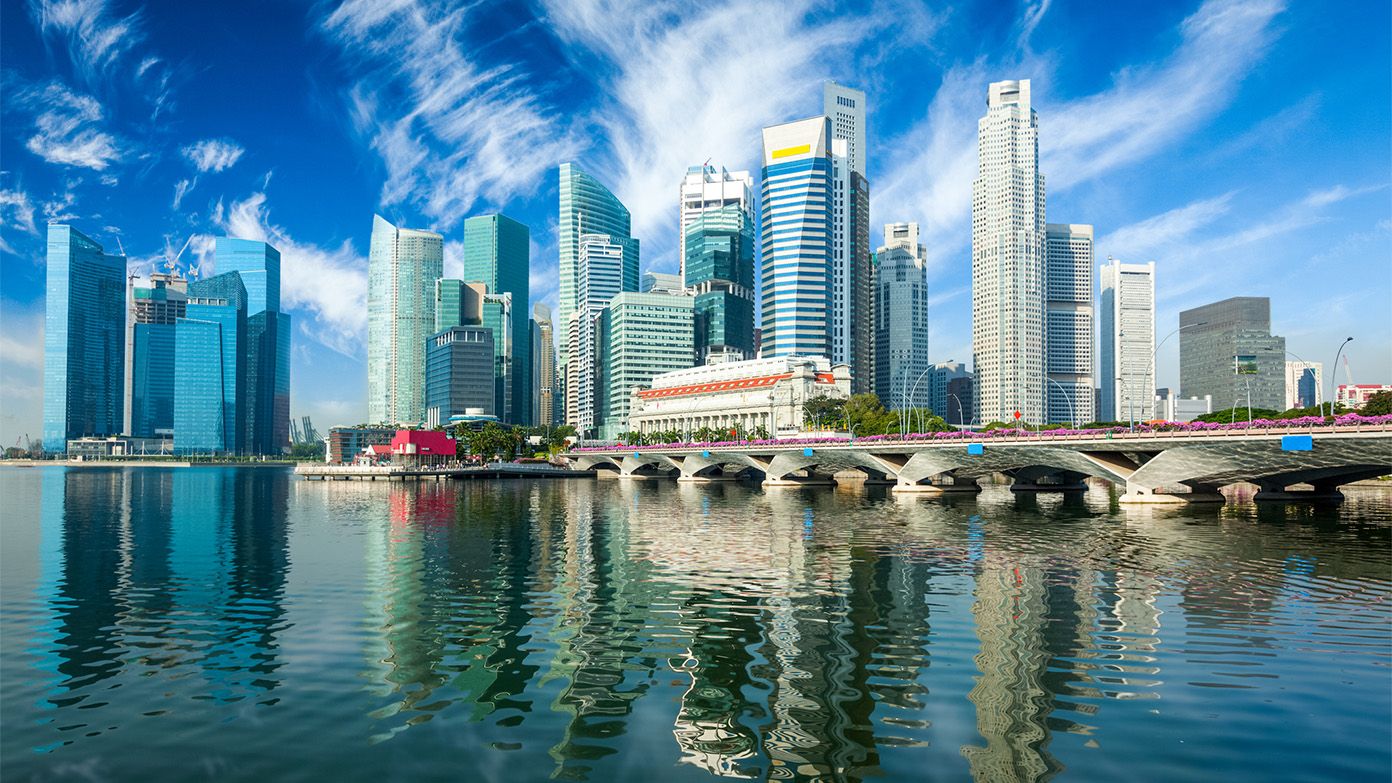A Singapore employer of record (EOR) allows your company to start hiring talent in minutes. Using an employer of record platform simplifies complex processes, ensuring compliance with local employment laws and regulations.
As a global EOR expert in Singapore, G-P manages payroll, employment contract best practices, statutory and market norm benefits, and employee expenses, and more via our global entity infrastructure. You’ll have peace of mind knowing you have a team of dedicated employment experts assisting with every hire. G-P allows you to harness the talent of the brightest people in 180+ countries, quickly and easily. This international approach enhances business reach and scalability by enabling hiring worldwide without a local establishment.
Hiring in Singapore with an employer of record
For businesses leveraging SaaS EOR services in Singapore to hire employees, understanding salary expectations is key. In Singapore, businesses need to understand the impact of country-specific tax regulations on compensation. Salaries vary by industry, role, and experience, but staying competitive is essential for attracting top talent. An EOR in Singapore offers companies insight into specific salary benchmarks, global and local standards. Beyond base pay, understanding benefits like health insurance, CPF contributions, and performance bonuses is crucial to fulfilling the talent requirements swiftly and effectively.
Watch how an EOR works
Singapore's labor laws
Adjustments to the Employment Act or CPF policies can impact employee compensation and benefits. A Singapore employer of record actively monitors these regulatory changes, enabling foreign businesses to maintain compliance while managing employment of international employees. It is pivotal to stay on top of legal considerations—including work permits, maternity, and paternity leave entitlements—to ensure full adherence. Handling these responsibilities efficiently requires adherence to specific legal parameters.
Employment contracts in Singapore
While a comprehensive written employment contract is a best practice, employers in Singapore are legally required to issue Key Employment Terms (KETs) in writing to all employees covered under the Employment Act. A locally compliant employment contract should clearly define an employee’s compensation, benefits , and termination requirements in Singapore Dollars (SGD).
As an EOR in Singapore, G-P ensures that all employment contracts meet the standards of the Ministry of Manpower (MOM) and include all mandatory KETs, protecting your company from legal risks.
Working hours in Singapore
Singapore's Employment Act 1968 is the primary legislation governing employment terms and conditions. Protections under Part IV of the Act, which cover working hours, rest days, and overtime pay, apply to:
-
Non-managerial or non-executive employees earning a basic monthly salary of up to SGD 2,600.
-
Workmen (employees engaged in manual labor) earning a basic monthly salary of up to SGD 4,500.
For these covered employees, working hours are generally limited to 8 hours per day or 44 hours per week. Overtime is payable at 1.5 times the hourly basic rate of pay.
Holidays in Singapore
Singapore observes 11 paid public holidays per year:
-
New Year’s Day
-
Chinese New Year (2 days)
-
Good Friday
-
Hari Raya Puasa
-
Labour Day
-
Vesak Day
-
Hari Raya Haji
-
National Day
-
Deepavali
-
Christmas Day
Leave requirements in Singapore
Annual leave in Singapore
Employees covered by the Employment Act who have worked for at least 3 months are entitled to paid annual leave. The statutory minimum starts at 7 days for the first year of service and increases by one day each year, up to a maximum of 14 days after 8 years of service. However, a market norm for most professional roles is 14 to 25 days of annual leave.
Sick leave in Singapore
After 3 months of service, employees are entitled to paid sick leave, provided they notify their employer within 48 hours and obtain a medical certificate. Employees with at least 6 months of service are entitled to 14 days of paid outpatient sick leave and 60 days of paid hospitalization leave annually (the 60 days includes the 14 outpatient days). For employees with 3 to 6 months of service, leave is prorated.
Maternity and paternity leave in Singapore
An eligible working mother is entitled to 16 weeks of paid maternity leave if her child is a Singapore citizen and she has worked for her employer for at least 3 months. For the first and second children, the employer pays for the first 8 weeks and the government pays for the last 8 weeks, subject to caps. The government funds the full 16 weeks for the third child and beyond.
For children born on or after January 1, 2024, eligible working fathers are entitled to 4 weeks of Government-Paid Paternity Leave (GPPL), funded by the government and capped at SGD 2,500 per week. The first 2 weeks are mandatory for employers to provide, while the remaining 2 weeks are provided on a voluntary basis by the employer, though this is expected to become mandatory.
A Singapore EOR simplifies the management of leave requirements by ensuring compliance with the Employment Act for annual leave, sick leave, maternity leave, and paternity leave. They handle the complexities of statutory minimums, prorated entitlements, and government funding for various leave types, allowing companies to focus on operations while maintaining legal adherence.
Compensation and benefits in Singapore
Health insurance in Singapore
While Singapore citizens and permanent residents are covered by a national health savings scheme (Medisave), employers are required to purchase medical insurance for all S Pass and Work Permit holders. Providing supplementary health and life insurance is a common market practice to attract top talent. An employer of record can help companies offer competitive benefits packages to employees in Singapore.
Ensure tax and compliance with an employer of record in Singapore
EOR products and services provide the necessary expertise in handling tax, payroll, and employment regulations. They handle tax management, payroll processing, and CPF contributions, significantly simplifying administration for global companies in Singapore. By handling complex local employment laws, companies ensure compliance while meeting global business standards.
Singapore Central Provident Fund (CPF)
The Central Provident Fund (CPF) is a mandatory comprehensive social security savings plan for Singapore citizens and Permanent Residents (PRs). Employers and employees must contribute a percentage of the employee's monthly wages to the CPF. As of 2025, the employer's contribution rate is 17% for employees up to age 55, with lower rates for older workers. G-P manages all CPF calculations and contributions as part of our payroll services, ensuring full compliance.
Bonuses in Singapore
While a 13th-month bonus is not legally required, it is a strong market norm in Singapore. Performance-based bonuses, often equivalent to 2-3 months' salary, are also common, particularly when the economy is strong.
Termination and severance in Singapore
Probationary periods of 3 to 6 months are common and should be stipulated in the employment contract. Notice periods for termination must be equal for both the employer and employee. If not specified in the contract, the statutory minimums apply:
|
Length of service |
Minimum notice period |
|---|---|
|
Less than 26 weeks |
1 day |
|
26 weeks to less than 2 years |
1 week |
|
2 years to less than 5 years |
2 weeks |
|
5 years or more |
4 weeks |
Severance pay is not legally mandated, but in cases of retrenchment, employers are strongly encouraged to provide a payment as outlined in tripartite advisories. For non-citizen employees leaving the country, employers must complete a tax clearance process (Form IR21) with the Inland Revenue Authority of Singapore (IRAS). G-P's AI-powered EOR service manages all compliant offboarding procedures, including final pay and tax clearance.
Expanding globally with EOR products and services
SaaS EOR services offer companies the ability to start operations in Singapore and globally without establishing a local entity . This strategy facilitates swift market entry and harnesses local talent pools efficiently. By managing hiring, payroll, and compliance, EORs simplify global business expansion, allowing companies to explore new markets with minimized risks and costs.
Selecting the right EOR partner in Singapore
Selecting an employer of record (EOR) in Singapore requires an assessment of their proficiency in handling various employment scenarios. Key factors to consider include the provider's proven history of assisting international businesses, their capability to deliver tailored solutions, and their deep understanding of Singapore’s legal frameworks. An EOR that provides integrated, efficient processes and reliable support can significantly contribute to cost-effective global hiring strategies. Entering into a partnership with an EOR that aligns with your business objectives will ensure seamless employment operations in Singapore, while strictly adhering to local legal requirements.
Read more on how to select the best employer of record.
Why G-P?
G-P EOR is the recognized leader in global employment, ranked No. 1 in every industry analyst report. G-P’s global employment platform delivers everything companies of all sizes need to manage the full employee lifecycle with its trusted Global HR Agent, G-P Gia, and AI-powered Employer of Record (EOR) and Contractor products. G-P supports teams in 180+ countries with more than a decade of global employment experience, the largest team of in-country HR, legal, and compliance experts, and its unmatched proprietary knowledge base.
G-P is also the preferred partner for leading HCM, PEO, and payroll platforms . Bring your workforce data together in one place to maintain existing workflows while guaranteeing consistent and accurate data across your integrated systems.
Request a proposal today to start hiring in Singapore today.




















